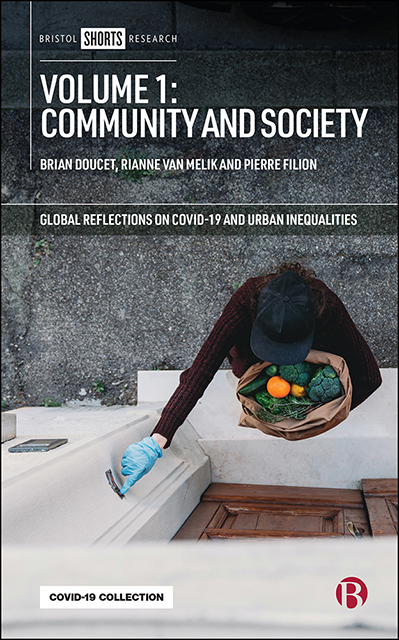Book contents
- Frontmatter
- Contents
- List of Figures and Tables
- Notes on Contributors
- Acknowledgments
- Preface to All Four Volumes of Global Reflections on COVID-19 and Urban Inequalities
- One Introduction
- Part I Working Practices
- Part II Life During Lockdown
- Part III Migration, Migrants, and Refugees
- Part IV Age, Race, Gender, and Ability
- Index
Twenty-One - COVID-19 and Blind Spaces: Responding to Digital (In)Accessibility and Social Isolation During Lockdown for Blind, Deafblind, Low Vision, and Vision Impaired Persons in Aotearoa New Zealand
Published online by Cambridge University Press: 13 April 2023
- Frontmatter
- Contents
- List of Figures and Tables
- Notes on Contributors
- Acknowledgments
- Preface to All Four Volumes of Global Reflections on COVID-19 and Urban Inequalities
- One Introduction
- Part I Working Practices
- Part II Life During Lockdown
- Part III Migration, Migrants, and Refugees
- Part IV Age, Race, Gender, and Ability
- Index
Summary
In response to increasing confirmed cases of COVID-19, the resident population of Aotearoa New Zealand entered a seven-week lockdown at midnight on March 25, 2020. The first five weeks were at level 4, with the population instructed to remain in their homes and associate only with those in their immediate household. All public gatherings were banned, non-essential businesses required to close public-facing services, domestic travel severely curtailed, and the border closed to all non-citizens. Official sources of information were daily 1pm briefings by the Prime Minister and the Director General of Health. These were broadcast live via radio, television, news websites, and social media. There was also a dedicated COVID-19 information website. The requirement to stay at home saw increased numbers of people working from home and increased use of video conferencing software (for example Zoom) as a mechanism for ‘meeting with’ colleagues, family, and friends. In this manner, digital and associated technologies extended the interpersonal space of the home beyond the physical confines of the domestic dwelling, drawing people together in digital spaces. Digital technologies integrated the previously separated workspace into the home environment allowing work colleagues to ‘see into’ personal spaces (see Hubbard, Volume 2; van Melik et al, Volume 3). This blurring of work and home shifted thinking about work contexts. Overall, the combination of lockdown, daily briefings, and increased digital connectivity contributed to a sense of shared experience across the country. However, these shared experiences were not equally available across the citizenry, with the COVID-19 pandemic exacerbating existing inequities.
Contemporary digital spaces inhabited during lockdown prioritized the needs of the fully able citizenry. Consequently, inherited power structures and hierarchies were digitally (re) produced (Lefebvre, 1991). Everyday space is typically designed by and for non-disabled people (Chouinard et al, 2010). Additionally, disabled people are marginalized from everyday social, economic, and political processes and spaces (Milner and Kelly, 2009). As a result, disabled persons are prevented from full participation as active and engaged citizens by abled persons in positions of decision-making power. In understanding the ways in which digital space(s) were (re)produced for blind, deafblind, low vision and vision impaired (BLV) persons during COVID-19 lockdown we make visible how contemporary urban society perpetuates historical processes of exclusion.
- Type
- Chapter
- Information
- Volume 1: Community and Society , pp. 235 - 244Publisher: Bristol University PressPrint publication year: 2021



